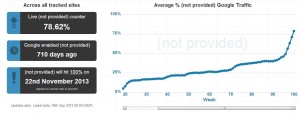I’m reading The Circle , Dave Eggers’s terrific new novel. The blurb describes it thus:
, Dave Eggers’s terrific new novel. The blurb describes it thus:
Set in an undefined future time, The Circle is the story of Mae Holland, a young woman hired to work for the world’s most powerful internet company. Run out of a sprawling California campus, the Circle has subsumed all the tech companies we know of now, linking users’ personal emails, social media, banking, and purchasing with their universal operating system, resulting in one online identity and a new age of civility and transparency.
Everything about the fictional company, as described by Eggers, screams “Google”. But in an interview on McSweeney’s he denies that it’s modelled on any particular company:
Q: Is this book about Google or Facebook or any particular company?
No, no. The book takes place after a company called the Circle has subsumed all the big tech companies around today. The Circle has streamlined search and social media into one system and that’s enabled it to grow very quickly in size and power.
Q: The campus described is so vivid. People will assume you’ve been to all the Silicon Valley tech campuses, especially Google.
There was a point where I thought I should tour some of the tech campuses, but because I wanted this book to be free of any real-life corollaries, I decided not to. I’ve never been to Google, or Facebook or Twitter or any other internet campus, actually. I didn’t interview any employees of any of these companies, either, and didn’t read any books about them. I didn’t want to be influenced by any one extant company or any actual people. But I’ve been living in the Bay Area for most of the last twenty years, so I’ve been very close to it all for a long time.
Well, if he hasn’t been to Google, then he’s clearly a fantastically intuitive writer because he seems to me to have nailed the creepy zeitgeist that pervades these tech companies. As in this passage:
Mae knew that she never wanted to work – never wanted to be – anywhere else. Her hometown, and the rest of California, the rest of America, seemed like some chaotic mess in the developing world. Outside the walls of the Circle, all was noise and struggle. But here, all had been perfected. The best people had made the best systems and the best systems had reaped funds, unlimited funds, that made possible this, the best place to work. And it was natural that it was so, Mae thought. Who else but utopians could make utopia?
Spot on. This is IMHO a terrific, bitingly satirical, perceptive novel — though not everybody agrees with me about that.




